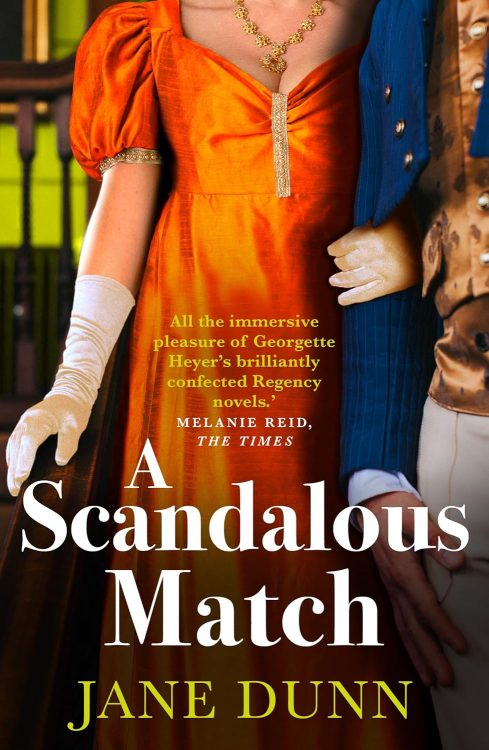
From the desk of Laurel Ann Nattress:
Please help me welcome author Jane Dunn to Austenprose today. Her latest Regency romance, A Scandalous Match, has just been released from Boldwood Books. Set in 1814 London, it features a heroine who is an actress and a hero with a complicated backstory. You can find the full book description at the bottom of this post.
As a new author, Jane has had incredible success. Her first two novels, The Marriage Season, and An Unsuitable Heiress received glowing reviews and topped the sales charts. I was curious about her third novel and Jane graciously agreed to an interview. Read on to discover more about her inspiration, protagonists, and admiration for other Regency writers.
Best, LA
AUTHOR INTERVIEW
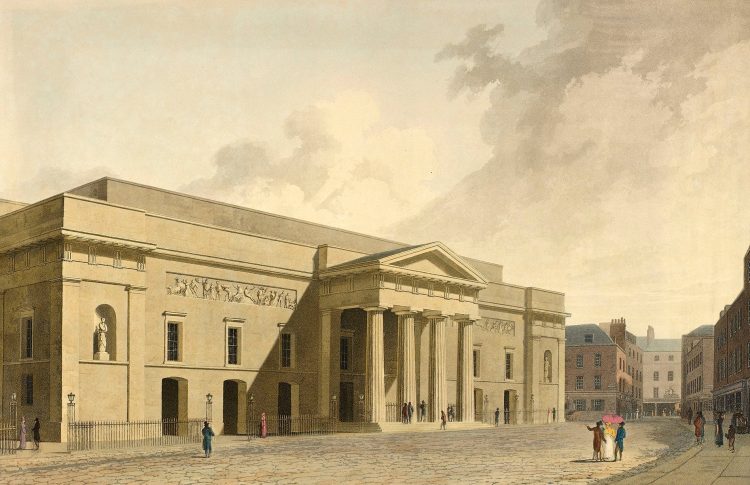
View of the east front of the new Theatre Royal, Covent Garden in 1809
Welcome, Jane. A Scandalous Match is set in London and the theatre world in the early 1800s. Can you please share your inspiration to write the story?
Thank you so much Laurel Ann for a great set of questions. I am very grateful for you and your readers’ interest. I really loved writing A Scandalous Match and so hope you all enjoy reading it, knowing a little more about how its setting, characters, and plot inspired me.
The Georgian and Regency Theater was so full of life it’s a wonderful backdrop to any story. Theater in London particularly was an egalitarian form of entertainment when most people, from petty criminals and the working classes to the nobility and the Prince Regent himself, rubbed shoulders. They shared the same love of Shakespeare, rude farces, water spectaculars, battle re-enactments and sentimental musicals. I really enjoy writing about women on the margins of High Society at this time and Angelica Leigh, a beautiful and successful actress, was nevertheless barred from entry to the upper classes by her lack of high birth and the disreputableness of her profession.
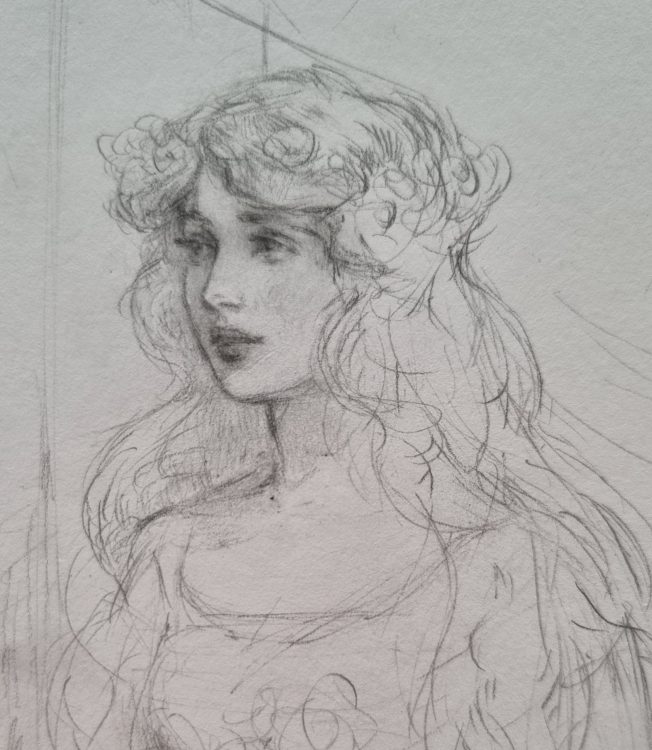
Illustration of heroine Angelica Leigh playing the part of Ophelia in the ‘Mad Scene,’ by Sally Dunne
Your heroine, Angelica Leigh, is a famous actress performing at Covent Garden. What is her background, and why are women in her profession are not acceptable as a marriage partner to the aristocracy?
Angelica was born to an Irish mother Amabel Leigh who had come to London to escape the poverty in Ireland. She is willing to do anything to keep a roof over her and her young daughter’s head and food on the table. She works for a gold trader and meets his rich customers, one of whom is the kind, goodhearted Mr Breville, a Yorkshireman whose sharp brain and hard work has made him very rich. Mrs Leigh becomes his mistress and her lofty ambitious for her daughter means she makes sure Angelica is taught all the ladylike accomplishments.
However, young women of ‘good family’ did not become actresses. It was a precarious profession when these young women, on stage for everyone to gaze at, were preyed on by men – both noble and poor who thought that an actress was somehow public property, only one rung above being a street walker or courtesan. Even the theater manager requests sexual favours in return for the lead role in a new play.
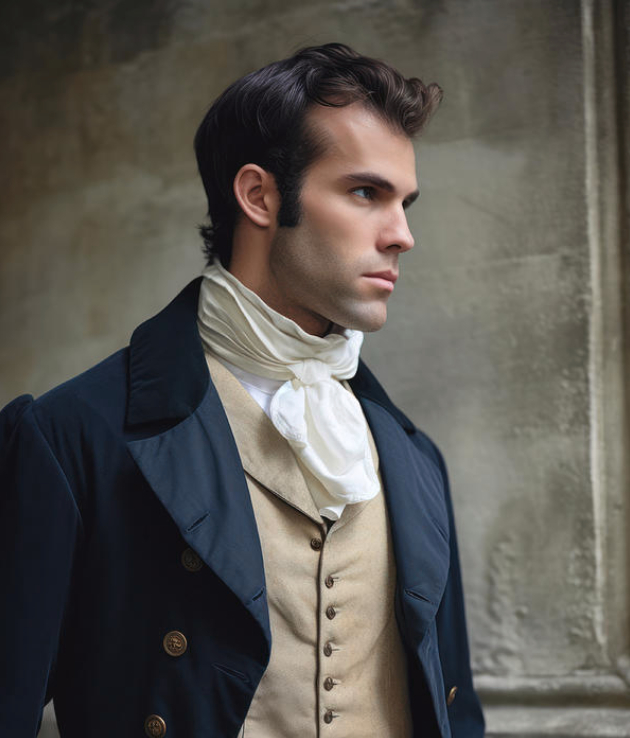
Illustration of a Regency gentleman, by Lee Avison
The Honourable Ivor Asprey is a respectable and desirable widow with a young daughter. What personality traits have you given him, and what are his biggest challenges in the story?
Ivor Asprey had lived the life of the average rich young Regency buck, gambling, drinking, womanizing, and going to gentleman’s clubs. He then became a prominent politician concerned about the appalling conditions for young children in the mills, as industrialization begins to make mill owners and industrialists very rich indeed, on the work of the poorest and voiceless. We meet him as a workaholic (not that that term was known or used at the time!) working hard at his parliamentary business, partly to deaden the grief and guilt he feels over the death from pneumonia of his young wife. He cannot risk opening his heart to love, apart from the great love he feels for his 11-year-old daughter, Elinor. His carefree nephew considers the risk-taking, vivid personality of his uncle’s youth has been suppressed and he is now just ‘a dull dog’. He will of course rediscover his zest for life!
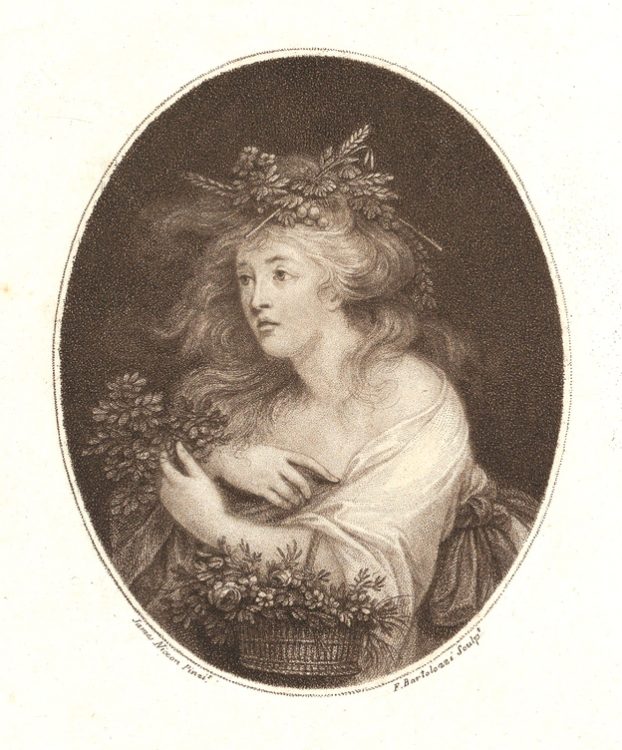
Ophelia (Shakespeare, Hamlet, Act 4), etching by Francesco Bartolozzi, after James Nixon (1784)
A Scandalous Match contains references to Shakespeare’s plays. What was your research process to put them in context in the story?
Shakespeare’s plays were so much part of every English person’s culture. The great soliloquies were known off by heart, and many in the audience then would say the words alongside the actors! I loved the fact that Shakespeare belonged to everyone and there was not this elitist element we have now about his plays. Hamlet struck me as the perfect play to introduce us to Angelica for although she was not as passive and tragic as Ophelia, the young woman she plays, she had a chance to show her real power to move the audience with her performance. There was also an interesting analogy between Prince Hamlet, whose elevated position in society meant he was not allowed to make a free choice of wife, and my young hero, Lord Latimer, who is heir to a great Dukedom with a powerful mother who is horrified by his marrying anyone so beneath him socially.
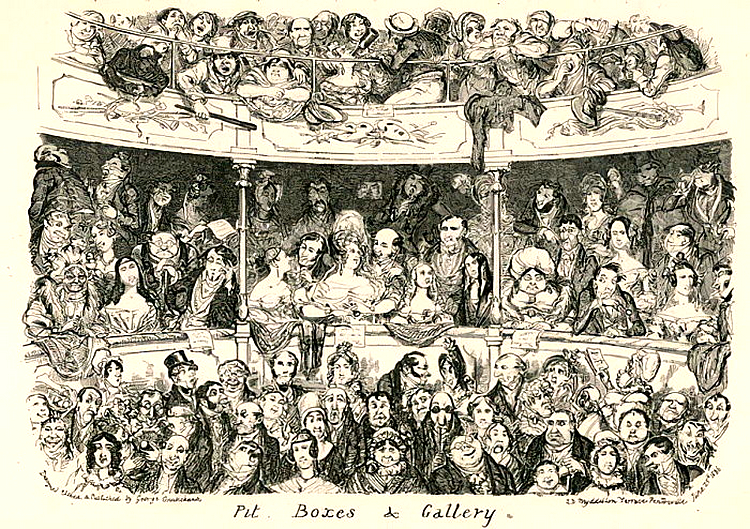
“Pit Boxes and Gallery” in a London theatre, by George Cruikshank (1836)
During your research of Regency-era theater and actors, did you discover anything surprising or enlightening about their lives and the world in which they performed?
I think what I discovered which excited and amused me most was just how rumbustious the audiences could be. The middle classes and nobility occupied the Boxes just above the Pit where the poorer classes congregated, eating, drinking, and chatting – interacting with the stage, either shouting abuse at the villains or leering at the actresses. Usually, it was a most lively scene and quite distracting for the actors. The upper Gallery was even more unruly. They too ate and drank, sometimes lobbing pie crusts or apple cores into the pit or onto the stage, but informal gambling and prostitution was also carried on, while in the Royal Box, one terrace below, the Prince Regent, his mistresses and cronies, were watching the play.
Have other Regency-era books inspired your writing? If so, can you recommend any books for our readers to enjoy as well?
There are so many brilliant Regency-era books, fiction and non-fiction. The obvious recommendation is any book by Jane Austen. She was a Regency woman, writing brilliantly about her own period. Therefore, she captures better than anyone every nuance of manners and emotion, the constraints on behavior but also the common motives and longings of humanity which we all share. Then I think the absolute queen of the fictional Regency is Georgette Heyer. Everything she wrote set in the Georgian or Regency is well worth reading. She knows her history, revels in the authentic language of the time and writes with such sparkling wit and intelligence.
There are so many modern writers setting their books in the Regency it is hard to know what to recommend. Personally, I only really enjoy Regency-era novels which have an authentic feel of the period and language. I also like to support self-published authors and so will mention a fantastic book by Beatrice Knight, Alverstone. She completely ‘gets’ English character and the history of the time and writes beautifully about her characters and the varied lives they live.
What is next in your writing career?
I have just finished a book about an older heroine, Leonora, (27 was consider old-maidish!) who is disinherited because she is not a son, her young illegitimate friend, and a wounded hero of the Napoleonic wars. It deals with confounding expectations and finding happiness in unexpected places. My heroine is a musician and also loves swimming in a lake – quite unusual at a time when women mostly only paddled in the sea at Brighton!
Lord Byron of course was a famously strong swimmer – and the original for all the Byronic Regency heroes in fiction who have followed. He swam the dangerous Hellespont from the Black Sea to the Aegean, some four miles, in 1810.
AUTHOR BIO
 Jane Dunn is an historian and biographer and the author of seven acclaimed biographies, including Daphne du Maurier and her Sisters, and the Sunday Times and NYT bestseller, Elizabeth & Mary: Cousins, Rivals, Queens. She comes to Boldwood with her first fiction outing – a trilogy of novels set in the Regency period, the first of which, The Marriage Season, is to be published in January 2023. She lives in Berkshire with her husband, the linguist Nicholas Ostler.
Jane Dunn is an historian and biographer and the author of seven acclaimed biographies, including Daphne du Maurier and her Sisters, and the Sunday Times and NYT bestseller, Elizabeth & Mary: Cousins, Rivals, Queens. She comes to Boldwood with her first fiction outing – a trilogy of novels set in the Regency period, the first of which, The Marriage Season, is to be published in January 2023. She lives in Berkshire with her husband, the linguist Nicholas Ostler.
INSTAGRAM | FACEBOOK | X (formerly known as Twitter) | BOOKBUB | GOODREADS
BOOK DESCRIPTION
‘Angelica had always known her lack of high birth, fortune or influence debarred her from being presented as an eligible young woman worthy of marriage. To cap it all, being an actress assured she was utterly beyond the pale of respectability.’
Nightly at the Covent Garden Theatre in London, an enchanting actress is wowing the crowds with her affecting portrayal of Ophelia. Preyed on by rakes and opportunistic young bucks, feted by dukes and earls, even the Prince Regent himself, Angelica Leigh is a sensation.
But in Regency England, beauty and talent are not enough to be considered marriage material, so when the eminently eligible Lord Charles Latimer sets his heart on Angelica, his uncle is sent to intervene.
As a highly respected, hard-working and wealthy lawmaker, The Honourable Ivor Asprey, is himself seen as desirable husband material, but widowed with an eleven-year-old daughter Elinor, he has forsaken all thoughts of romance. Lord Latimer’s mother, the Duchess of Arlington, despairs of her son, despite being reassured by Ivor that his infatuation with the actress will pass. But there is something about Angelica Leigh that demands attention, and even the austere and upstanding Mr Asprey isn’t immune to her charms.
Sunday Times bestselling author Jane Dunn brings the Regency period irresistibly to life. Perfect for fans of Jane Austen. Janice Hadlow, Gill Hornby, and anyone with a Bridgerton-shaped hole in their lives.
BOOK INFORMATION
- A Scandalous Match, by Jane Dunn
- Boldwood Books (January 17, 2024)
- Trade paperback, eBook, & audiobook (360) pages
- ISBN: 978-1804835456
- Genre: Regency Romance, Historical Romance
AMAZON | PUBLISHER | ADD TO GOODREADS
We purchased a copy of the book for our own enjoyment. Cover image, book description, author interview & bio courtesy of Boldwood Books © 2024; text Laurel Ann Nattress © 2024, austenprose.com, an Amazon affiliate.
If you enjoy the content on Austenprose.com, please like, comment, share, and subscribe to receive email notifications of new posts.



This was a lovely interview; I enjoyed reading about the historical aspect of the book; the images and portraitures help quite a bit. Thank you for sharing!
LikeLike